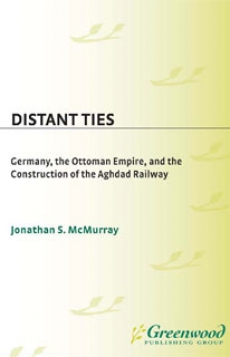 Distant Ties: Germany, the Ottoman Empire, and the Construction of the Baghdad Railway
I first encountered the Baghdad Railway nearly a decade ago while traveling in the cramped quarters of an otherwise affordable wagon across the Turkish plains. At the time, the railway's complex history was the furthest thing from my mind; I was far more concerned with the fact that the slow-moving "express" train had failed to live up to its name. By the time I reached my destination, I vowed to forego the train on my return journey home and take the bus instead.
I later came across a simple, century-old photograph that sparked my interest in the railway's history. The photo showed a crowd posed politely behind lamb carcasses that had been strewn conspicuously across a lonely pair of rails. This diverse crowd of onlookers—distinguishable by their varied headgear of turbans, fezzes, and felt top hats—melded seamlessly together in celebration of the grand opening of the Baghdad Railway's first section. Although the photo's caption described the "Berlin-Baghdad" railway as a stunning achievement of German imperialism, the crowd in the photograph (and my personal experiences in the countries involved in its construction) alerted me that a fascinating story of the railway's construction had yet to be told...
Contents
Preface / ix
Abbreviations / xi
Introduction / 1
1. The German Discovery of the Ottoman Empire / 13
2. Early Trials and Conventional Wisdom, 1899-1908 / 39
3. The Young Turks and the Baghdad Railway, 1908-1914 / 69
4. The First World War and the Baghdad Railway, 1914-1918 / 109
Conclusion / 137
Selected Bibliography / 139
Index / 151 Introduction
Departing from the usual analysis of the Baghdad Railway as a symbol of German imperialism, this book revisits the railway's construction sites on the Ottoman frontier to document the important Ottoman contribution to the enterprise and reveal the dynamics of a developing Turco-German partnership that came into being during the railway's construction. By analyzing the railway as a joint Turco-German enterprise and not as the sole product of German ingenuity and capital, this study provides the first balanced historical account of the railway's construction and its cultural implications.
As the focal point of a shared Turco-German imperial strategy, the Baghdad Railway was instrumental in forging a lasting Turco-German partnership. The railway's construction sites served as experiments in intercultural living and as the proving ground for emerging Turco-German relations. Far removed from the centers of state power, railway personnel grew more attentive to regional concerns than to Great Power policies. German railway planners, forced to revise their plans to compensate for the harsh construction environment, grew increasingly dependent on Ottoman hospitality, security, and labor, and their ability to compromise in the face of adversity.
The Baghdad Railway did not force the Ottoman Empire into German orbit. On the contrary, the railway helped to restore the Ottoman Empire to health and allowed German imperial demands to be redirected to satisfy Ottoman domestic needs. Although German personnel actively participated in each phase of the railway's planning and construction, the Ottomans maintained control over the railway's pace, route, and progress. Far from being a nail in the "Sick Man's" coffin, the Baghdad Railway gave the Ottoman Empire a new lease on life, strengthening its ability to counter German economic and political expansion. The Ottoman leadership used the Baghdad Railway project to play off Great Power rivalries and safeguard its status as a sovereign state...
DISTANT TIES
Germany, the Ottoman Empire, and the Construction of the Baghdad Railway
Jonathan S. McMurray
Westport, Connecticut, London
Library of Congress Cataloging-in-Publication Data
McMurray, Jonathan S.
Distant ties : Germany, the Ottoman empire, and the construction of the Baghdad Railway / by Jonathan S. McMurray.
p. cm.
Includes bibliographical references and index.
ISBN 0-275-97063-9
1. Baghdad Railway—History. 2. Railroads—Iraq—History. 3. Investments,
German—Turkey—History. I. Title.
TF113.I7M37 2001
385/.0956—dc21 2001021184
British Library Cataloguing in Publication Data is available.
Copyright © 2001 by Jonathan S. McMurray
All rights reserved. No portion of this book may be
reproduced, by any process or technique, without the
express written consent of the publisher.
Library of Congress Catalog Card Number: 2001021184
ISBN: 0-275-97063-9
First published in 2001
Praeger Publishers, 88 Post Road West, Westport, CT 06881
An imprint of Greenwood Publishing Group, Inc.
www.praeger.com
Printed in the United States of America
The paper used in this book complies with the
Permanent Paper Standard issued by the National
Information Standards Organization (Z39.48-1984).
10 9 8 7 6 5 4 3 2 1
JONATHAN S. McMURRAY holds degrees in history, German, and religion and has received fellowships from the Fulbright Commission and the American Research Institute in Turkey. He recently served as Senior Writer/Researcher on the Presidential Advisory Commission on Holocaust Assets in the United States, where he was a key contributor to the commission's final report.

PDF
Destûra daxistina; vê berhêmê nîne.
|